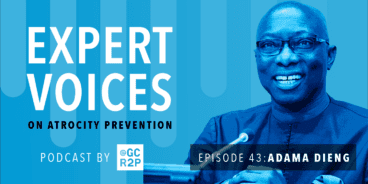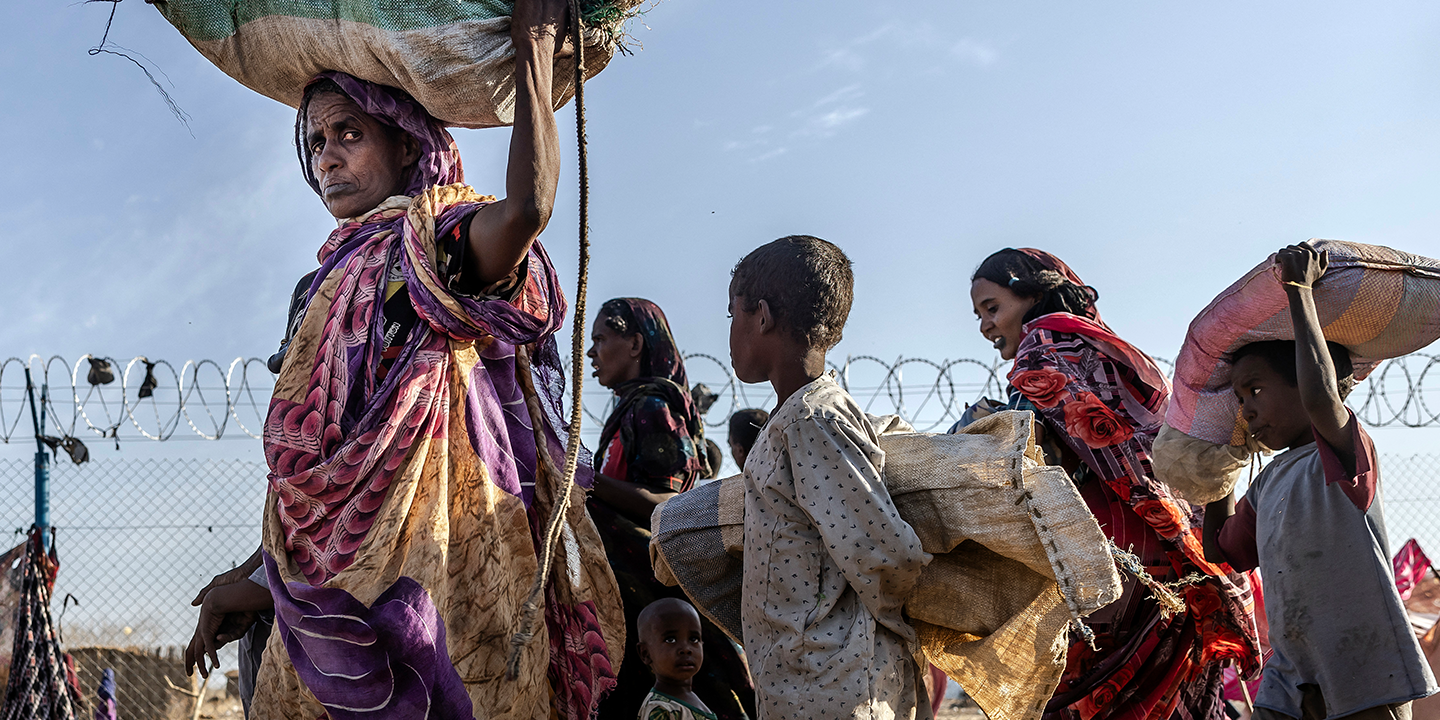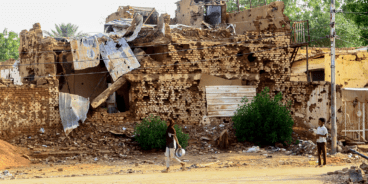

Atrocity Alert No. 422: Sudan, Myanmar (Burma) and the Democratic Republic of the Congo
Atrocity Alert is a weekly publication by the Global Centre for the Responsibility to Protect highlighting situations where populations are at risk of, or are enduring, mass atrocity crimes.
FAMINE CONDITIONS SPREAD IN SUDAN AS FIGHTING CONTINUES
The war in Sudan, now in its 20th month, continues to devastate the country, causing widespread suffering among the civilian population and fueling a catastrophic humanitarian crisis. In late December and early January, the Sudanese Armed Forces (SAF) escalated their offensive against the Rapid Support Forces (RSF) in and around Khartoum, with airstrikes on 28 December and 5 January killing at least 20 civilians and injuring many others. News reports indicate that both sides are mobilizing for a potential escalation in Bahri, a city north of Khartoum.
Violence in Darfur also persists, particularly around El Fasher. In a report published on 20 December, the Office of the UN High Commissioner for Human Rights documented the killing of at least 782 civilians and the injury of over 1,143 since the siege of El Fasher began in May 2024. These numbers only reflect verified incidents and do not reflect the complete scope of the situation. On 7 January the United States concluded that the deliberate targeting of certain ethnic groups in Darfur by the RSF constitutes acts of genocide and sanctioned RSF leader Mohamed Hamdan ‘Hemedti’ Dagalo for his role in committing these atrocities.
The conflict has left over 24.6 million people – half of Sudan’s population – experiencing acute food insecurity. A report published in December by the Integrated Phase Classification (IPC), an international tool for assessing food security, identified famine in five areas. This follows the declaration of famine in Zamzam camp, North Darfur, in August 2024. The IPC warned that famine conditions have spread to Al Salam and Abu Shouk camps, as well as the Western Nuba Mountains, and are expected to worsen in North Darfur localities by May 2025, including Um Kadadah, Melit, El Fasher, At Tawisha and Al Lait.
On 19 December, Edem Wosornu, Director of Operations and Advocacy for the UN Office for the Coordination of Humanitarian Affairs, warned the UN Security Council (UNSC) that “fears and hostilities in populated areas are escalating and spreading in an atmosphere of evident disregard for international humanitarian law. Civilians are being killed and injured in unbearable numbers, millions are stalked by the threat of famine in the world’s largest hunger crisis, sexual violence is rife, and education and healthcare facilities are in ruins.”
Following the failed November resolution, the UNSC must continue efforts to address Sudan’s crisis. Strong measures are needed to protect civilians and prevent further atrocity crimes. The international community must pressure the warring parties to establish a nationwide ceasefire, ensuring that all sides adhere to international law and facilitate the unrestricted flow of aid. Both the RSF and SAF must cease hostilities and allow humanitarian assistance to reach affected areas.
ARMED GROUPS SIGNAL OPENNESS TO MEET WITH MYANMAR’S JUNTA
Despite ongoing conflict throughout Myanmar (Burma) between the military and ethnic resistance organizations (EROs), on 2 January the junta released the results of a controversial census. The census was conducted during 2024 in a purported attempt to compile a voter list for general elections tentatively planned for late 2025. Due to ongoing insecurity, and the loss of control of significant territory to EROs, the military completed the census in less than half of the country’s 330 townships. In conducting the new census, the junta failed to address grievances and risks raised during the 2014 census, notably the lack of official recognition of all of the country’s diverse population groups, including the Rohingya, against whom a genocide was perpetrated by the military in 2017.
The inability to conduct a full census is a direct result of the violence that has been ongoing since the Myanmar military overthrew the democratically elected government in February 2021. Civilians across the country have endured relentless war crimes and crimes against humanity, including indiscriminate and targeted attacks on civilians and civilian objects, sexual and gender-based violence and abduction and forced recruitment of children, among others. The UN Special Rapporteur on the situation of human rights in Myanmar, Tom Andrews, has also warned of the junta’s “systematic restriction” of aid, leaving thousands of civilians cut off from aid and “on the brink of starvation.” The situation is particularly dire in Rakhine State where the UN Development Programme has projected famine conditions by April 2025, leaving 2 million people, including the persecuted Rohingya population, at risk of starvation.
Over the past year resistance forces have seized control of significant territory in Myanmar, with an estimated 19.1 million people living outside of areas of junta control. Although their anti-military offensives continue, some armed groups, notably members of the Three Brotherhood Alliance, have indicated a willingness to participate in political dialogues. Most recently, on 20 December, the Arakan Army, which has been leading an offensive in Rakhine State since November 2023, issued a statement in support of political talks, vowing to “stand firmly and steadfastly to ensure that the political aspirations of the entirety of Myanmar’s oppressed population are realized in unison,” despite reports of widespread abuses against ethnic Rohingya populations in and around their areas of control.
Global Centre Executive Director Savita Pawnday said, “States must continue to refuse legitimizing the junta, including by not supporting proposed elections in light of the flawed census, the current restrictions on civic space and the junta’s record of committing atrocities across the country. While some groups have agreed to talks with the junta, the international community must press for these talks to be centered around self-determination, justice, accountability and upholding the rights of Myanmar’s diverse peoples in order to grant them the lasting peace and justice they deserve.”
UNSC RENEWS MONUSCO’S MANDATE AMID ESCALATING ATROCITY RISKS IN DR CONGO
On 20 December the UN Security Council renewed the mandate of the peacekeeping mission in the Democratic Republic of the Congo (DRC), MONUSCO, for another year. MONUSCO had previously been in the process of withdrawing from the DRC, following a 2023 request by the government, but conflict dynamics in the eastern region of the country prompted a reevaluation of the mission’s termination.
The decision to extend MONUSCO’s mandate comes amid a trend in intensified attacks by the Allied Democratic Forces (ADF) and rapid territorial expansion by the March 23 Movement (M23) in recent months. The UN Joint Human Rights Office in the DRC documented 344 human rights violations and abuses in November 2024, predominantly in eastern DRC, resulting in 1,334 victims. The data corresponds to an increase of 47 percent compared to the number of victims recorded just a month before.
Clashes between the M23 and the DRC’s armed forces have further intensified after a peace summit held in mid-December ended without success. Nearly 85,000 people were displaced by M23 fighting in early December and an additional 100,000 have been displaced in the first week of January alone as M23 rebels seized control of the strategic town of Masisi.
One of the drivers of violence in eastern DRC is competition over the region’s precious minerals and natural resources. According to the UN group of experts on the DRC, some mines and critical transportation routes for minerals are controlled by armed groups implicated in massacres of civilians, widespread sexual violence and other crimes. In this context, the DRC filed a criminal complaint against Apple in mid-December, accusing the company of using minerals sourced from illegal mining in its supply chain. Apple disputed the claims, but stated that it had notified its suppliers to suspend sourcing tin, tantalum, tungsten and gold from the DRC and Rwanda in light of the escalating conflict in the region.
While Apple is not the only company implicated in the use of conflict minerals, and the public sector also bears responsibility for enacting and enforcing regulation, this case is another example of a trend in increased scrutiny on international supply chains and corporate responsibility in preventing atrocity crimes and broader human rights violations.
As the eastern DRC continues to grapple with violence, MONUSCO’s presence remains critical in supporting civilian protection. However, a long-term solution will require a multifaceted approach. All parties to the conflict must rigorously abide by the ceasefire agreement, and Rwanda must end its military support for M23. The international community should suspend military assistance to governments found to be supporting armed groups, while neighboring states should ensure that forces active in the DRC refrain from illicit activities. Strengthening governance and ensuring sustainable resource management are essential steps toward breaking the cycle of violence and exploitation.
Related Content


Atrocity Alert No. 434: Sudan, Ethiopia and the UN Human Rights Council
